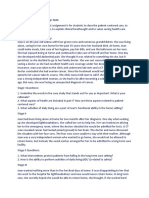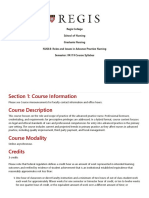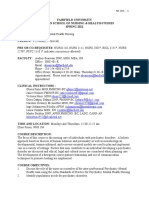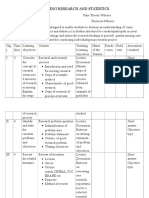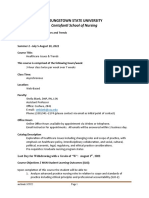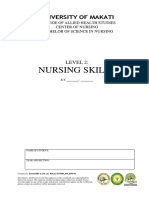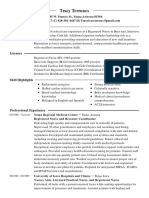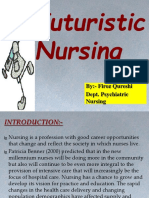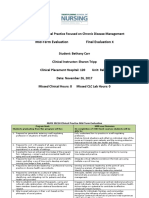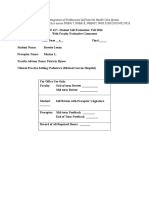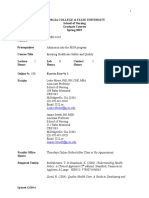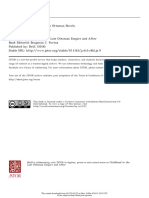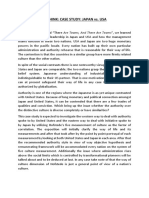NRSG 7030 2015 Syllabus-4 3 2
NRSG 7030 2015 Syllabus-4 3 2
Uploaded by
api-310557802Copyright:
Available Formats
NRSG 7030 2015 Syllabus-4 3 2
NRSG 7030 2015 Syllabus-4 3 2
Uploaded by
api-310557802Original Title
Copyright
Available Formats
Share this document
Did you find this document useful?
Is this content inappropriate?
Copyright:
Available Formats
NRSG 7030 2015 Syllabus-4 3 2
NRSG 7030 2015 Syllabus-4 3 2
Uploaded by
api-310557802Copyright:
Available Formats
Georgia College & State University
School of Nursing - NRSG 7300 Primary Care of Women Fall 2015
Course
Faculty
NRSG 7030 Primary of Women (2-6-4)
Deborah MacMillan Ph.D., CNM, APRN-BC (Coordinator)
Associate Professor
Home (478) 994-9354
Office (478) 752-1074
Cell (478) 747-0986
Email debby.macmillan@gcsu.edu
Additional
Janet Campbell MSN, C-WHNP
Clinical
Clinical Faculty
Faculty
(478) 747-5400
(478) 474-8619
janet.campbell@gcsu.edu
Krystal Canady, DNP, C-FNP
Office (478) 752-1074
Assistant Professor GCSU
Email krystal.canady@gcsu.edu
Sheryl Winn DNP, C-ANP
Office (478) 752-1074
Cell (478) 397-1739
Email sheryl.winn@gcsu.edu
Shannon Merritt DNP, C-FNP
(478) 365-2029
Email shannon.merritt@gcsu.edu
Faculty
Office
Hours
By appointment either on-line or face-to-face as needed
Georgia College & State University
School of Nursing - NRSG 7300 Primary Care of Women Fall 2015
Course
Focuses on combining caring, commitment, and concern with skill
Descriptio and knowledge to provide optimal care for women. This course
n
emphasizes socialization and role development in the area of
advanced practice in womens health care. The student is
prepared to serve as advocates and employ critical/creative
thinking to advance solutions to health care problems for women
in diverse circumstances. Students are required to critically
examine their own beliefs and consider legal/ethical and cultural
issues in relation to womens health care. Focuses on primary
care health deviations common to women and lifespan
concerns/transitions of women, including the perinatal experience
and crises experienced uniquely by women. This course reflects
standards of JOGN, ACNM, ANA and AWHONN.
Required Textbook: Schuiling, K. & LIkis, F. (2011) Womens
Gynecologic Health 2nd Edition. Jones & Bartlett Publishers
ePocrates Plus University Library Access Provided (free)
Open Online Textbook for Anatomy & Physiology (free)
Access the following link:
https://openstaxcollege.org/textbooks/anatomy-and-physiology
Program
Goals:
Suggested Textbook: Hatcher, R.A., Trussell, J., Stewart, F.,
Stewart, G.K., Kowal, D., Guest, F., Cates, W., & Policar, M.S. 19 th
Edition. Contraceptive technology. New York: Irvington.
1. Demonstrate effective communication through
collaboration, partnerships, presentations, and scholarly
writing.
2. Improve healthcare outcomes using scholarly inquiry and
analysis of evidence.
3. Demonstrate advanced practice leadership and
management principles to mitigate risk and enhance
healthcare delivery systems.
4. Model use of legal and ethical professional standards.
5. Partner with the client in the provision of compassionate
and coordinated care, based on respect for the clients
preferences, values, and needs.
Georgia College & State University
School of Nursing - NRSG 7300 Primary Care of Women Fall 2015
6. Use data to monitor and improve the quality and safety of
health promotion & disease prevention outcomes.
7. Advocate for social justice and equity in healthcare by
supporting improvements in regulatory, legislative, and
public policy development.
8. Collaborate within nursing and inter-professional team
members to foster open communication, mutual respect,
and shared decision making.
Course
Goals
9. Demonstrate essential informatics competences to analyze
data and evidence-based care practices.
10.Demonstrate the competencies associated with the
advanced practice role.
Upon completion of this course, the student will:
Program
Course Outcomes
Objectiv
es
1, 2, 9, 10 Analyze and apply current research findings
related to primary care in women's health.
2, 5, 8, 10
1, 2, 3, 5
1, 5, 10
2, 5, 10
4,5, 7, 10
Computer
Competen
Incorporate strategies of risk analysis and
screening, education, lifestyle change,
environmental influences, disease detection and
prevention, and health promotion into aspects of
primary care of women throughout the lifespan
constantly recognizing the importance of
individual client differences.
Articulate the role of the family nurse
practitioner in providing gynecological,
obstetrical and family planning care to women.
Diagnose common acute and chronic conditions
and analyze clinical management techniques
found among women and be aware of
appropriate referral patterns related to common
acute and chronic conditions.
Integrate knowledge of pharmacologic and nonpharmacologic treatments into women's health
care plans.
Discuss generic legal and ethical issues related
to advanced practice nursing of women and their
families.
Georgia College & State University
School of Nursing - NRSG 7300 Primary Care of Women Fall 2015
cy
1, 2, 3, 6
Further analyze global environmental issues,
social policy, and health care system change and
role development that impact women's health.
This is an online course. All classes will be conducted using either
synchronous Collaborate class format or asynchronous online
class format. Students must have access to Internet and ability to
use D2L and WebEx. Basic computer competency with Microsoft
office is expected. Attendance and active participation is a course
expectation.
Topic
Outline
Feminist Frameworks for Nursing Practice with Women
Womens Growth and Development Across the Life Span
o Review of Reproductive System Endocrine
Function/Dysfunction
o Well Women Exams
o Preconception Counseling
o Health Promotion and Maintenance
o Sexuality
o Gynecologic Health Care for Sexual and Gender
Minorities
Assessment, management, and treatment of common
womens normal life events
o Menarche
o Menses
o Desire for fertility control (contraception)
o Pregnancy
o Menopause
Assessment, management, and treatment of common
womens disorders
o Abnormal Cytology
o Abnormal uterine bleeding
o Gynecologic Infections and Sexually Transmitted
Infections
o Menstrual Cycle Pain and Discomforts
o Pelvic Pain
o Premenstrual Syndrome (PMS)
o Premenstrual Dysphoric Disorder (PMDD)
o Hyperandrogenic Disorders
o Benign Gynecologic Conditions
o Gynecologic Cancers
o Breast Conditions
Mastalgia
Nipple Discharge
Georgia College & State University
School of Nursing - NRSG 7300 Primary Care of Women Fall 2015
Benign Breast Masses
Breast Cancer
o Female Sexual Dysfunction
Special Topics
o Mental Health
o Substance Abuse and Women
o Intimate Partner Violence and Sexual Violence
o Human Trafficking Recognition and Prevention
Teaching/Learning Methods: Lecture; discussion; required and
recommended reading assignments; guest lecture; computer based unit and
final examinations; case narrative; Audio/video/PowerPoint presentations;
Discussion Board Postings and EMRs with journal article summaries; clinical
experience in womens healthcare setting and self-evaluation.
Evaluation Methods: Clinical performance is evaluated using a
Satisfactory/Unsatisfactory system. The student must earn a satisfactory
rating on the clinical evaluation to pass the course. STUDENTS WHO ARE
RATED AS CLINICALLY UNSATISFACTORY WILL BE ASSIGNED A COURSE GRADE
OF "F. The student must successfully complete both didactic and clinical
components with an average of B or higher to progress. Failure in either
theory or clinical portions of this c course will result in course failure. The
final course letter grade will be calculated from the numerical grade received.
If the clinical grade is S, the course grade will be calculated as follows:
Grading
Criteria:
Exam I
Exam II
Final Exam
Case Narratives (1)
Case Study Discussion Leader
EMRs 5 over semester
20%
20%
25%
15%
15%
5%
Clinical Experience with a
minimum of 90 hours that
enables student to demonstrate
competency by end of semester
based on:
S/U
S/U
Clinical Evaluation by
faculty
Daily Electronic Clinical
Logs
Georgia College & State University
School of Nursing - NRSG 7300 Primary Care of Women Fall 2015
Grading Scale:
The grading scale for this course is as follows: 91-100 (A),
83-90 (B), 75-82 (C), 66-74 (D), and 65 or less (F).
Exams - Individual Work (40% Course Grade)
Students will have 2 exams during the semester on the assigned readings
and recorded lectures.
Case Narrative - Individual Work (15% of course grade)
During the course of the semester the student will complete a Case
Narratives. The case narrative will utilize a patient seen in the clinical
setting/or a clinical topic of interest to the student that is relevant to the
primary care of women. Turn it in anti-plagiarism software will be used for this
assignment. The student will follow the outline provided for this narrative.
Summary of common diseases/illnesses seen in selected body system
pertinent to womens health practice. 20%.
Pertinent subjective data 10%
Pertinent objective data 10%
Diagnosis with differential (Include pathophysiology of the specific
diagnosis, as well as diagnostic tests and labs needed to confirm) 25%.
Management plan, including Rx, education, prevention, and follow-up
(Discuss the pharmacokinetic and pharmacodynamics of the drug
treatment) 20%
Current Guidelines and research pertinent to disease 15%
Case Study Discussion Leaders - Group Work (15% of course grade)
A group of students will be assigned a clinical problem of importance for
womens health by the instructor. The students will develop discussion
question(s) about the management of this clinical problem for their peers.
Students will respond to these questions and the case study leaders will
moderate the discussion.
Electronic Medical Record (5%)
Submission of 5 electronic medical records over the semester.
Final Exam (25% of Course Grade)
The final exam for this course will be cumulative and cover the material from
the entire course. It will be a combination of multiple choice and case study
questions.
Georgia College & State University
School of Nursing - NRSG 7300 Primary Care of Women Fall 2015
Clinical Experience: Minimum lab hours required for satisfactory completion
of this course are 90. You will need to be in a practice(s) that sees well
women visits (normal gynecology/primary care) and women experiencing
specific problems associated with gynecology (peri-menopause, menopause,
abnormal pap smears, urinary and pelvic floor disorders); as well as
contraceptive visits. The practice(s) must also care for women during their
early pregnancy and postpartum period. Clinical preceptors/sites must be
approved by the course coordinator prior to beginning clinical
experiences. Students will not be allowed to begin clinical hours if
any clinical documents are expired. You will need to see a variety of
patients during the semester. There is no set amount of hours you have to
spend in each area, but you do need to have enough hours that will allow you
this diversity of patients. All clinical hours will be documented using the
electronic medical record. It is the students responsibility to contact
clinical faculty (either by email or phone) within the first week of the
course and provide written documentation of the dates and times
that they will be in the clinical setting using Evalue. Clinical hours at
times will need to be modified to accommodate the clinical faculties ability to
visit and provide feedback to you.
Course Policies
All policies in the current Georgia College & State University
Graduate Catalog and the Graduate Nursing Student
Handbook are applicable. Please consult web site for these
documents at the following sites:
http://catalog.gcsu.edu/grad/index.htm
http://info.gcsu.edu/intranet/health_sciences/gradforms.htm
Rounding Policy: Rounding for this course will occur only
with the final average grade for the course. There will be no
rounding of exam grades or other written assignments during
the semester. If the final course average to the nearest tenth
is 0.5 or more, the final course grade will be rounded up to the
next whole number (i.e. 88.5 would be rounded to 89)
Attendance: Attendance at all scheduled face-to-face
classes or a synchronous online class enhances the learning of
all class participants. Students are expected to attend all
classes and to notify the faculty member if unforeseen events
occur that prevent attendance. Students are expected to
complete the learning activities within the week that
they are assigned. All discussions are to be completed
by Sunday at midnight during the week in which they
are assigned. NO makeup exams will be given. If a student
Georgia College & State University
School of Nursing - NRSG 7300 Primary Care of Women Fall 2015
has notified the faculty member of an excused absence such
as hospitalization or death in the family prior to the scheduled
final exam beginning, the student will have points from that
exam added to the final exam if faculty are not notified the
student will receive a zero for that exam. Cell phones and
beepers are to be turned off during class, clinical and other
professional activity.
In addition to these University and School policies, students
are expected to comply with the following course policies:
All students must regularly check bobcats email to receive
official communication from university faculty and staff.
All students must have an activated Bobcat identification
card. The Bobcat card is required to use all library
services, including the computer lab for testing, and to
access the classrooms in the Macon Center.
Graduate Testing Policy for online courses
Verification of Student Identity in Online Education
A new federal requirement has been put into place by the U.S.
Department of Education requiring schools to verify the identity of
online students. In response to this requirement, Georgia College
Graduate Nursing Program has adopted the following policy to ensure
that:
The student who registers in online education course or program is the
same student who participates in and completes the course or program
and receives the credit by verifying the identity of a student who
participates in class or coursework.
The student who registers for an online course may elect either of the
following Student verification options that are offered by GC
Graduate Nursing Program
o
o
Face to Face testing at the Macon Graduate Campus
Proctored Examinations
Technology
Requirements
The minimum technology requirements:
http://www.gcsu.edu/technology/campustech/recommendation
s.htm
Microsoft on-line training resource:
http://office.microsoft.com/en-us/support/trainingFX101782702.aspx?redir=0
Georgia College & State University
School of Nursing - NRSG 7300 Primary Care of Women Fall 2015
Academic
Honesty
The integrity of students and their written/oral work is a
critical component of the academic process. All written work
submitted in this course will be individual work unless
otherwise instructed. The submission of anothers work as
ones own is plagiarism and will be dealt with using the
procedures outlined in the university policies. Remember that
allowing another student to copy ones own work is considered
cheating. This course will utilize anti-plagiarism software Turn it in for all assignments that are submitted. Also see the
student Honor Code at the website below:
http://www.gcsu.edu/studentlife/handbook/code.htm
Religious
Observance
Students are permitted to miss class in observance of religious
holidays and other activities observed by a religious group of
which the student is a member without academic penalty.
Exercising of ones rights under this policy is subject to the GC
Honor Code. Students who miss class in observance of a
religious holiday or event are required to make up the
coursework missed as a result from the absence. The nature
of the make-up assignments and the deadline for completion
of such assignments are at the sole discretion of the
instructor. Failure to follow the prescribed procedures voids all
student rights under this policy.
The full policy and prescribed procedures are found at:
http://senate.gcsu.edu/prod/motions/support_docs/499/12955
33007_Religous%20Observance%20Policy%20for
%20senate.docx
Fire Drill
Procedure
Fire drills will be conducted annually. In the event of a fire
alarm, students will exit the building in a quick and orderly
manner through the nearest hallway exit. Learn the floor plan
and exits of the building. Do not use elevators. If you
encounter heavy smoke, crawl on the floor so as to gain fresh
air. Assist disabled persons and others if possible without
endangering your own life. Assemble for a head count at the
designated assembly area for this building. For more
information on other emergencies, please visit
http://www.gcsu.edu/emergency/actionplanmain.htm
Request for
Disability
If you have a disability as described by the Americans with
Disabilities Act (ADA) and the Rehabilitation Act of 1973,
Georgia College & State University
School of Nursing - NRSG 7300 Primary Care of Women Fall 2015
Modifications:
Unacceptable
clinical behaviors
Section 504, you may be eligible to receive accommodations
to assist in programmatic and physical accessibility. Disability
Services, a unit of the GCSU Office of Institutional Equity and
Diversity, can assist you in formulating a reasonable
accommodation plan and in providing support in developing
appropriate accommodations to ensure equal access to all
GCSU programs and facilities. Course requirements will not be
waived, but accommodations may assist you in meeting the
requirements. For documentation requirements and for
additional information, we recommend that you contact
Disability Services located in Maxwell Student Union at 478445-5931 or 478-445-4233. Any student requiring instructional
modifications due to a documented disability should make an
appointment to meet with Dr. Debby Macmillan within in the
first week of classes. An official letter from GCSU documenting
the disability is expected in order to receive accommodations.
Breaching confidentiality, privacy and/or security.
Abandoning or knowingly neglecting patients/clients
requiring nursing care.
Failing to report to appropriate person when leaving the
clinical area.
Failing to report critical information to the appropriate
person.
Failing to report own errors.
Fabricating information.
Failing to notify appropriate person or agency in
advance, if unable to attend clinical lab activity.
Performing procedures without appropriate preparation,
supervision, or authorization.
Failing to comply with the Policy on Substance Abuse as
described in the Graduate Student Handbook
Failing to treat clients, families, staff, faculty, and other
students with respect and dignity
Failing to provide nursing care because of diagnosis,
age, gender, ethnicity, creed, or sexual orientation.
Using inappropriate or unsafe judgment, technical skill,
or interpersonal behaviors in providing nursing care.
Failing to notify the appropriate party of any
unprofessional conduct with may jeopardize
patient/client safety.
Failing to practice nursing in accordance with prevailing
nursing standards due to physical or psychological
impairment.
Georgia College & State University
School of Nursing - NRSG 7300 Primary Care of Women Fall 2015
Diverting prescription drugs for own or anothers use.
Misappropriating money or property (stealing) from a
patient/client, other person or facility/agency.
You might also like
- Safety Unfolding Nursing Case StudyDocument3 pagesSafety Unfolding Nursing Case StudyclarimerNo ratings yet
- Eportfolio AssignmentDocument5 pagesEportfolio Assignmentprabhjot sainii100% (1)
- BPT (Bachelor of Physiotherapy)Document8 pagesBPT (Bachelor of Physiotherapy)mmumullana0098No ratings yet
- Change Theory Project: Laura Chahalis Nursing Management - N4455Document13 pagesChange Theory Project: Laura Chahalis Nursing Management - N4455Inna NaraievskaNo ratings yet
- Regis NU668 Syllabus FA119Document24 pagesRegis NU668 Syllabus FA119laotzu570No ratings yet
- AMSN Scope Standards MS NursingDocument27 pagesAMSN Scope Standards MS NursingPaulEspartinezNo ratings yet
- AWHONN Standards 8th Ed. 2019Document45 pagesAWHONN Standards 8th Ed. 2019Nicole CanadaNo ratings yet
- Samuel Merritt University Nursing Program Pediatric Nursing Clinical EvaluationDocument14 pagesSamuel Merritt University Nursing Program Pediatric Nursing Clinical EvaluationSerbanNo ratings yet
- n5529w Syllabus Fall 2019 Section 100Document15 pagesn5529w Syllabus Fall 2019 Section 100api-548092124No ratings yet
- NRSG 7010 SyllabusDocument6 pagesNRSG 7010 Syllabusapi-310557802No ratings yet
- BSN Learning Plan Senior CapstoneDocument3 pagesBSN Learning Plan Senior Capstoneapi-258684779100% (1)
- Chapter 26Document46 pagesChapter 26meeeenonNo ratings yet
- Nursing Research Sara Jo Brown Edition Comparison 3 Edition Versus 4th EditionDocument3 pagesNursing Research Sara Jo Brown Edition Comparison 3 Edition Versus 4th Editionynottrip0% (1)
- Quality of Life: The Assessment, Analysis and Reporting of Patient-reported OutcomesFrom EverandQuality of Life: The Assessment, Analysis and Reporting of Patient-reported OutcomesNo ratings yet
- MatSam581031Algebra2ResourceSampler LowDocument60 pagesMatSam581031Algebra2ResourceSampler LowPraveen Kumar Dusi100% (1)
- Iii Q1M3Document33 pagesIii Q1M3Jeffrey Yumang50% (2)
- Updated NRSG 7050 Syllabus 2015 4Document7 pagesUpdated NRSG 7050 Syllabus 2015 4api-310557802No ratings yet
- 5480 Syllabus 2014 SummerDocument6 pages5480 Syllabus 2014 Summerapi-310557802No ratings yet
- 1 Armstrong Atlantic State University Department of Nursing Nursing 3345Document9 pages1 Armstrong Atlantic State University Department of Nursing Nursing 3345Denisia HoltNo ratings yet
- NURS 3305 Syllabus Spring 2022Document13 pagesNURS 3305 Syllabus Spring 2022Chris GongNo ratings yet
- Fundamentals Syllabus NUR 392Document14 pagesFundamentals Syllabus NUR 392Pearl KingaNo ratings yet
- N 657 - Advanced Physical Assessment Clinical Decision MakingDocument17 pagesN 657 - Advanced Physical Assessment Clinical Decision Makingapi-267840127No ratings yet
- Nursing Research and StatisticsDocument6 pagesNursing Research and StatisticsSathya PalanisamyNo ratings yet
- NUR 612 Syllabus 2021Document14 pagesNUR 612 Syllabus 2021LaverneNo ratings yet
- VN 100 Fundamentals of Nursing With Case Studies March 2013 A Jul 3 - Instructor Felix LevyDocument15 pagesVN 100 Fundamentals of Nursing With Case Studies March 2013 A Jul 3 - Instructor Felix LevycalfornianursingacadNo ratings yet
- WCU NURS 491L - Integration of Nursing Practice - 2014fall - I - 8-4-14Document29 pagesWCU NURS 491L - Integration of Nursing Practice - 2014fall - I - 8-4-14Joseph MeyerNo ratings yet
- Nurs 6900 Syllabus Summer 22 1Document8 pagesNurs 6900 Syllabus Summer 22 1api-635690065No ratings yet
- Clinical Nursing JudgementDocument6 pagesClinical Nursing Judgementapi-508132058No ratings yet
- 13 Screening DiagnosticDocument1 page13 Screening Diagnostichoneytrap99No ratings yet
- MidtermDocument15 pagesMidtermapi-400034813No ratings yet
- NUR3165 MS Nursing Research For Evidence-Based Practice 16 Week Fall 2022Document16 pagesNUR3165 MS Nursing Research For Evidence-Based Practice 16 Week Fall 2022Somie Jr. SanchezNo ratings yet
- SEP 2023 Syllabus Human Physiology Updated 5-29-23Document6 pagesSEP 2023 Syllabus Human Physiology Updated 5-29-23gfsgfdsgfdNo ratings yet
- QsenDocument16 pagesQsenapi-239630424100% (1)
- Lehman College Department of Nursing Clinical Evaluation Form Nursing 303Document7 pagesLehman College Department of Nursing Clinical Evaluation Form Nursing 303m_shouli2090No ratings yet
- MSC Degree in Nursing - Nursing Services Adminstration - English VersionDocument8 pagesMSC Degree in Nursing - Nursing Services Adminstration - English VersionHemantNo ratings yet
- Midterm Evaluation - Nurs 2020Document6 pagesMidterm Evaluation - Nurs 2020api-240864098No ratings yet
- Manual RleDocument25 pagesManual RleMark Jason P Diaz100% (1)
- Test Bank For Clinical Nursing Skills and Techniques 10th EditionDocument51 pagesTest Bank For Clinical Nursing Skills and Techniques 10th Editionwillsonfury645No ratings yet
- Final Placement Evaluation 1Document9 pagesFinal Placement Evaluation 1api-659065431No ratings yet
- NFDN 2004 - Prenatal Teaching 2023 V1.23 PNDIENDocument4 pagesNFDN 2004 - Prenatal Teaching 2023 V1.23 PNDIENieltsb612No ratings yet
- Book Biochemistry Amp Nutrition For BSC Nursing 1st y PDFDocument1 pageBook Biochemistry Amp Nutrition For BSC Nursing 1st y PDFsubiNo ratings yet
- A. As A Nurse, How Do You Develop Your Critical Thinking?Document17 pagesA. As A Nurse, How Do You Develop Your Critical Thinking?Princess Melanie MelendezNo ratings yet
- Tracy Terrones Resume 1Document2 pagesTracy Terrones Resume 1api-315217520No ratings yet
- Cno Test-Yourself-DocumentationDocument6 pagesCno Test-Yourself-Documentationapi-631170779No ratings yet
- Eportfolio MaternityDocument2 pagesEportfolio Maternityapi-318874763No ratings yet
- Nursing: Undergraduate Study 2016Document18 pagesNursing: Undergraduate Study 2016kgiyerNo ratings yet
- NURS 115 Course Syllabus 201910 DMLDocument41 pagesNURS 115 Course Syllabus 201910 DMLJade BouchardNo ratings yet
- Health Care PolicyDocument39 pagesHealth Care PolicyTurikumwe EmmanuelNo ratings yet
- B.sc. Nursing Syllabus.Document120 pagesB.sc. Nursing Syllabus.Asif AliNo ratings yet
- Nurs FPX 4010 Assessment 2 Interview and Interdisciplinary Issue IdentificationDocument4 pagesNurs FPX 4010 Assessment 2 Interview and Interdisciplinary Issue Identificationfarwaamjad771No ratings yet
- NURS-FPX 4010 Collaboration and Leadership Reflection VideoDocument8 pagesNURS-FPX 4010 Collaboration and Leadership Reflection VideoIrene WafulaNo ratings yet
- Leadership Compiled Edited (Long) FinalDocument21 pagesLeadership Compiled Edited (Long) Finalms_pringlesNo ratings yet
- Futuristic Nursing: By:-Firoz Qureshi Dept. Psychiatric NursingDocument37 pagesFuturistic Nursing: By:-Firoz Qureshi Dept. Psychiatric NursingpadmaNo ratings yet
- FINAL - Changes - NURS 401 Medication Safety and Calculation Quiz Information - 2Document12 pagesFINAL - Changes - NURS 401 Medication Safety and Calculation Quiz Information - 2guneet cheema0% (1)
- Proofed - Nurs 3021 Final EvaulDocument20 pagesProofed - Nurs 3021 Final Evaulapi-313199824No ratings yet
- Nurs 3021h Final EvaluationDocument12 pagesNurs 3021h Final Evaluationapi-313097878No ratings yet
- Text Analysis ReportDocument5 pagesText Analysis ReportElvis Rodgers DenisNo ratings yet
- NURS 492 Nursing Capstone - 2016 - FALL - IDocument18 pagesNURS 492 Nursing Capstone - 2016 - FALL - IAnjelica BedrosNo ratings yet
- Nurs FPX 4010 Assessment 3 Interdisciplinary Plan ProposalDocument5 pagesNurs FPX 4010 Assessment 3 Interdisciplinary Plan Proposalfarwaamjad771No ratings yet
- Self Assessment - Midterm 2016Document11 pagesSelf Assessment - Midterm 2016api-341527743No ratings yet
- Ethical Care 2 Nurs 217Document9 pagesEthical Care 2 Nurs 217api-283946728No ratings yet
- Certificate of Completion-Nih S BarnesDocument1 pageCertificate of Completion-Nih S Barnesapi-310557802No ratings yet
- Georgia College and State University School of Nursing Episodic DocumentDocument10 pagesGeorgia College and State University School of Nursing Episodic Documentapi-310557802No ratings yet
- Georgia College and State University School of Nursing Episodic DocumentDocument11 pagesGeorgia College and State University School of Nursing Episodic Documentapi-310557802No ratings yet
- Informatics Final1Document6 pagesInformatics Final1api-310557802No ratings yet
- Georgia College and State University School of Nursing Episodic DocumentDocument12 pagesGeorgia College and State University School of Nursing Episodic Documentapi-310557802No ratings yet
- Womens 5 Emr Revised Fall 2014 RevDocument12 pagesWomens 5 Emr Revised Fall 2014 Revapi-310557802No ratings yet
- Running Head: ADVOCACY 1 Advocacy Salena Barnes, RN, BSN NRSG 7410 Georgia College and State UniversityDocument6 pagesRunning Head: ADVOCACY 1 Advocacy Salena Barnes, RN, BSN NRSG 7410 Georgia College and State Universityapi-310557802No ratings yet
- A Case Narrative of Trichomoniasis Final RevisedDocument6 pagesA Case Narrative of Trichomoniasis Final Revisedapi-310557802No ratings yet
- Womens Final 1 EmrDocument11 pagesWomens Final 1 Emrapi-310557802No ratings yet
- Georgia College and State University School of Nursing Episodic DocumentDocument11 pagesGeorgia College and State University School of Nursing Episodic Documentapi-310557802No ratings yet
- Women Emr 2 Revi 3Document12 pagesWomen Emr 2 Revi 3api-310557802No ratings yet
- Ms Emr Adult IIDocument12 pagesMs Emr Adult IIapi-310557802No ratings yet
- Final Emr Sbirt Adult II RevDocument11 pagesFinal Emr Sbirt Adult II Revapi-310557802No ratings yet
- Womens Emr 3 Revi 2Document12 pagesWomens Emr 3 Revi 2api-310557802No ratings yet
- Hypothyroid Emr Adult IIDocument12 pagesHypothyroid Emr Adult IIapi-310557802No ratings yet
- Georgia College and State University School of Nursing Episodic DocumentDocument12 pagesGeorgia College and State University School of Nursing Episodic Documentapi-310557802No ratings yet
- Emr-Neuro 1 1Document11 pagesEmr-Neuro 1 1api-310557802No ratings yet
- NRSG 6110 SyllabusDocument6 pagesNRSG 6110 Syllabusapi-310557802No ratings yet
- NRSG 5800 SyllabusDocument5 pagesNRSG 5800 Syllabusapi-310557802No ratings yet
- Korsakoffs Paper 1Document3 pagesKorsakoffs Paper 1api-310557802No ratings yet
- Sbirt PaperDocument4 pagesSbirt Paperapi-310557802No ratings yet
- Asthma Final PaperDocument4 pagesAsthma Final Paperapi-310557802No ratings yet
- Contoh RPPDocument6 pagesContoh RPPFary WdNo ratings yet
- English Upsr - English Paper 2 - Section B 2 (B) - How To Write Your Reasons - SamplesDocument6 pagesEnglish Upsr - English Paper 2 - Section B 2 (B) - How To Write Your Reasons - Samplesinspiron1977No ratings yet
- UNICEF Nutrition Conceptual - FrameworkDocument2 pagesUNICEF Nutrition Conceptual - FrameworkRayhanatu QalbiNo ratings yet
- Curriculum Map: Filipino 10Document14 pagesCurriculum Map: Filipino 10Ging Cadungog-AlegreNo ratings yet
- W8 DLP ELS Oct 26 2022Document5 pagesW8 DLP ELS Oct 26 2022Anne RiveroNo ratings yet
- IndexDocument6 pagesIndexrahmatika kayyisNo ratings yet
- Grateful InfographicDocument1 pageGrateful InfographicAniaNo ratings yet
- Pronunciation Test: Testing and Evaluation Miss Norhayati BT ZainDocument26 pagesPronunciation Test: Testing and Evaluation Miss Norhayati BT ZainMuhammad Asyhraf0% (1)
- Abe OutlineDocument6 pagesAbe Outlineapi-303211347No ratings yet
- English Project - Every Cloud Have Silver LiningDocument12 pagesEnglish Project - Every Cloud Have Silver LiningKumud HasijaNo ratings yet
- Professional Computing & Information Processing HandbookDocument58 pagesProfessional Computing & Information Processing HandbookMohammad SayeedNo ratings yet
- Class of 2014Document16 pagesClass of 2014attorneychenNo ratings yet
- MA Sociology New 2012Document63 pagesMA Sociology New 2012Indianhoshi HoshiNo ratings yet
- Dr. Bandula Wijay BioDocument5 pagesDr. Bandula Wijay BioRice University GMI100% (3)
- Chapter Four Presentation, Analysis, and Interpretation of DataDocument5 pagesChapter Four Presentation, Analysis, and Interpretation of DataHazmaign Adlayan ArzadonNo ratings yet
- FTU LEADERSHIP SYLLABUS Summer 2021Document12 pagesFTU LEADERSHIP SYLLABUS Summer 2021Quang Phuc VoNo ratings yet
- Charging by FrictionDocument14 pagesCharging by FrictiontongaiNo ratings yet
- Brill Childhood in The Late Ottoman Empire and AfterDocument25 pagesBrill Childhood in The Late Ottoman Empire and AfterÇilem TuğbaNo ratings yet
- Worksheet RenaissanceDocument2 pagesWorksheet RenaissanceSmita ChandraNo ratings yet
- MG5581 Coursework Brief 2021.22 FINAL - YZDocument6 pagesMG5581 Coursework Brief 2021.22 FINAL - YZDeeksha JinaNo ratings yet
- Campus Map en 2022Document2 pagesCampus Map en 2022yesihavenNo ratings yet
- The Exceptional Annual Schedule of English Level and Stream: 2Document4 pagesThe Exceptional Annual Schedule of English Level and Stream: 2Mid KaouNo ratings yet
- Personalized Learning and ESSA What We Know and Where We GoDocument23 pagesPersonalized Learning and ESSA What We Know and Where We GoLukwago UmaruNo ratings yet
- Group Think: Case Study: Japan vs. UsaDocument4 pagesGroup Think: Case Study: Japan vs. UsaVaibhav DubeyNo ratings yet
- Mark Scheme (Results) January 2021Document23 pagesMark Scheme (Results) January 2021Βασιλεία ΕυαγγέλουNo ratings yet
- SIWES Report 275Document35 pagesSIWES Report 275Sulaiman Yusuf Sada100% (2)
- ICED Service Learning ContractDocument2 pagesICED Service Learning ContractIngrid LabastidaNo ratings yet
- Blue Modern Employee Handbook BookletDocument12 pagesBlue Modern Employee Handbook BookletKent DaradarNo ratings yet
